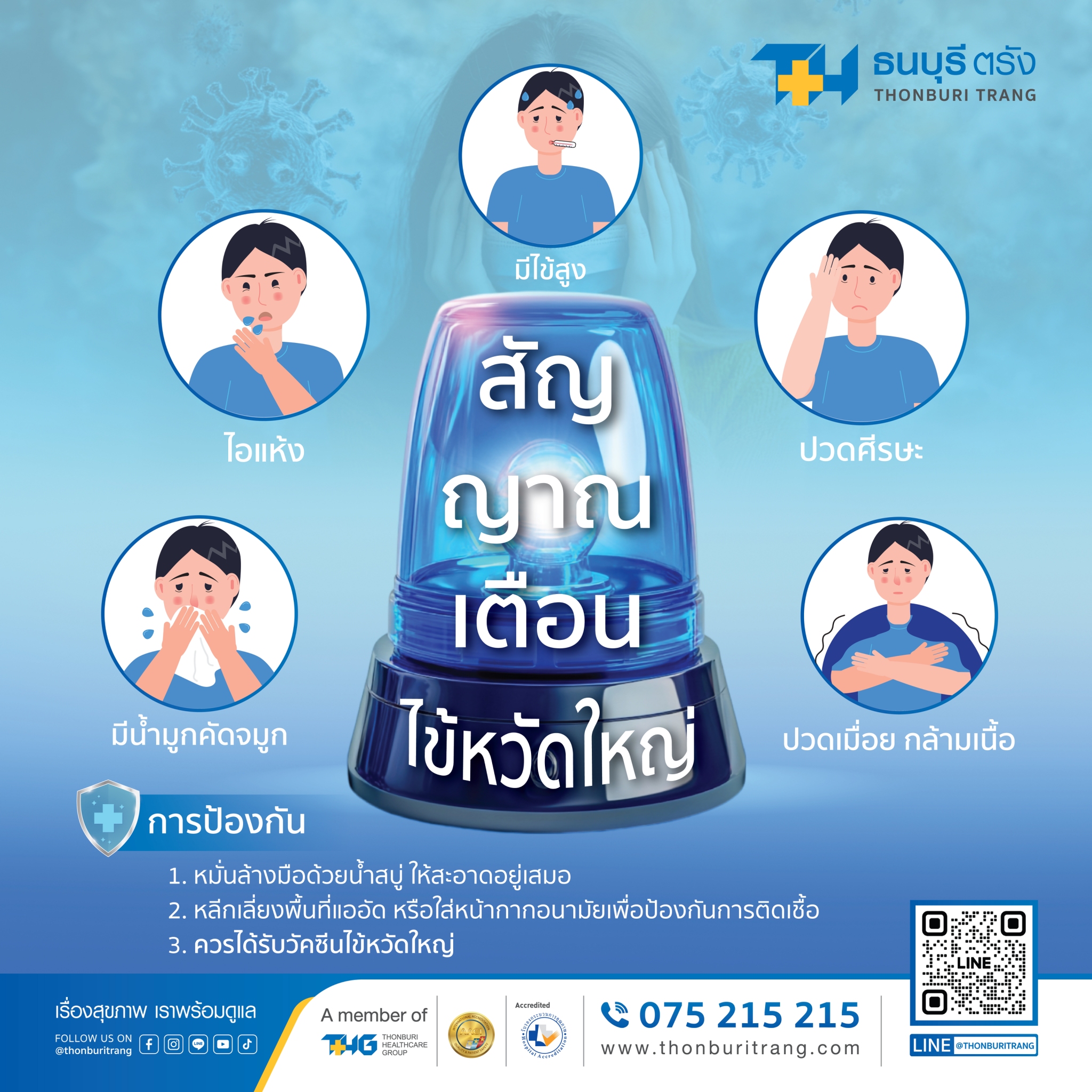 Thonburi Trang
Thonburi Trang

ไข้สูงทันที หนาวสั่น อ่อนเพลียมาก
ไอแห้ง เจ็บคอ น้ำมูกไหล/คัดจมูก
ปวดศีรษะ ปวดเมื่อยกล้ามเนื้อ
เด็กเล็กอาจอาเจียน/ท้องเสียร่วม
หอบ หายใจลำบาก หน้าอกบุ๋ม ปาก/ปลายเล็บเขียว
ไข้สูงเกิน 2–3 วัน ไม่ยอมดื่มน้ำ ซึม เหนื่อยผิดปกติ
ชักจากไข้ อาเจียนกินไม่ได้
เด็กเล็กอายุน้อยกว่า 5 ปี (โดยเฉพาะ <2 ปี) หรือมีโรคประจำตัว (หืด หัวใจ ปอด ภูมิคุ้มกันต่ำ)
ลดไข้ตามน้ำหนักตัว + พักผ่อน
ดื่มน้ำ/นมให้พอ แบ่งจิบบ่อย ๆ
แยกของใช้–ใส่หน้ากาก–เปิดอากาศถ่ายเท
หมายเหตุ: ยาปฏิชีวนะไม่ช่วยไข้หวัดใหญ่ (เป็นไวรัส) แพทย์อาจพิจารณายาต้านไวรัสในรายเสี่ยง/เริ่มอาการไม่เกิน ~48 ชม.
ล้างมือสม่ำเสมอ ทำความสะอาดของเล่น–พื้นผิว
ปิดปาก/จมูกเวลาไอจาม งดไปโรงเรียนถ้ามีไข้
วัคซีนไข้หวัดใหญ่ทุกปี: ฉีดได้ตั้งแต่อายุ ≥6 เดือน
ครั้งแรกในช่วงอายุ 6 เดือน–8 ปี อาจต้อง 2 เข็ม (ห่างกันอย่างน้อย 4 สัปดาห์) ตามคำแนะนำแพทย์
เด็กโต/ผู้ใหญ่ส่วนใหญ่ ปีละ 1 เข็ม
มีสัญญาณอันตราย/เสี่ยงภาวะแทรกซ้อน
ต้องการประเมินเพื่อรับยาต้านไวรัส/ใบรับรอง/แผนดูแลที่บ้าน
บริการ: ตรวจโดยกุมารแพทย์ วัดออกซิเจน เอกซเรย์/ตรวจเพิ่มเติมเมื่อจำเป็น คำแนะนำแยกโรค–ดูแลที่บ้าน และบริการ ฉีดวัคซีนไข้หวัดใหญ่ประจำปี
Q: ต่างจากหวัดทั่วไปยังไง?
A: ไข้หวัดใหญ่เริ่มไว ไข้สูง ปวดเมื่อยมาก และเพลียกว่าอย่างชัดเจน
Q: ลูกกินยาแก้ไข้แล้วพอไหม?
A: ช่วยบรรเทา แต่เด็กเสี่ยง/เริ่มอาการใหม่ ๆ อาจได้ประโยชน์จากยาต้านไวรัส—ให้แพทย์ประเมิน
Q: ฉีดวัคซีนช่วงไหนดีที่สุด?
A: ก่อนฤดูกาลระบาดของปี (แต่ ฉีดเมื่อไหร่ก็ยังดีกว่าไม่ฉีด)
Q: เป็นไข้หวัดใหญ่แล้ว ยังต้องฉีดวัคซีนไหม?
A: ควรฉีดตามฤดูกาลอยู่ดี เพราะไวรัสเปลี่ยนสายพันธุ์และภูมิในปีถัดไปลดลง
โรงพยาบาลธนบุรี ตรัง (THG) — กุมารเวชกรรม/คลินิกวัคซีน
โทร 075-215-215 • Line/FB: @THONBURITRANG • เปิด 24 ชม.
ปุ่มแนะนำ: “นัดกุมารแพทย์” | “จองวัคซีนไข้หวัดใหญ่”